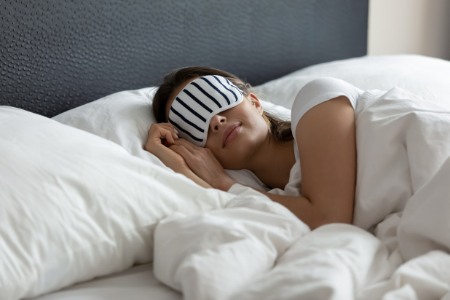
Sleeping in new environments can sometimes trigger latent insomniac tendencies. It can manifest in difficulty falling and remaining asleep or waking up early. It’s a well-studied phenomenon in sleep science known as the “first-night effect.” In that state, half of your brain remains alert while the other half sleeps. It’s your brain’s way of protecting you against danger in unfamiliar places.
You may experience the “first-night effect” when sleeping at a friend’s house, hotels, or new places. Don’t worry, though. This article will give you advice on how to avoid insomnia in a new home.
1. Sleep Products That Help You Avoid Insomnia in a New Home
Depending on how severe your insomnia is, you’ll need the weapons to fight and win this war. These sleep products can help you avoid insomnia in your new house:
- Sleep mask to minimize the pressure from your eyes.
- A weighted blanket to help you feel safe, making you fall asleep faster.
- A white noise machine that enables you to sleep soundly and avoid insomnia in your new house.
- A full-body pillow that will help you sleep in a comfortable position if you’re a side sleeper.
- Breathable clothes to help your body’s temperature remain constant throughout the night.
- A memory foam pillow to rest your head and neck for comfortable sleep.
- A lofty memory foam mattress topper to help soften the impact of an extra firm mattress.
- Blue-light-blocking glasses to wear when using electronics.
- Noise-canceling earplugs that can reduce noises that wake you up in the middle of the night.
- 0% caffeine herbal teas to help you enjoy better sleep at night.
- Sleep-friendly light bulbs that eliminate blue light.
Other products that will aid in combatting your insomnia include comfortable bedding and a high-quality mattress. Do your research to learn what would work best for you. Sites like Comfybeddy, an Australian company, reviews both mattresses and bedding. The company has been serving people suffering from the lack of sleep for years and has helped many people overcome their insomnia.
2. Consider Sleep Supplements
If you’re suffering from insomnia, consider trying sleep supplements, especially melatonin-rich extracts. Melatonin is the hormone responsible for regulating your inner body clock. Thus, one of its purposes is telling your body when to go to sleep and when to awaken.
Insomnia is the natural result when your body doesn’t produce enough sleep hormone. So, supplementing melatonin might be an effective way to fight insomnia. Other herbal remedies like lavender, valerian, and chamomile might also help alleviate insomnia.
3. Use the Power of Your Mind
If you don’t have the budget to invest in sleep products, seeing as you’ve just invested in a new place, here’s a military technique used by soldiers to fall asleep when they’re in combat. In essence, it’s a modified body scan meditation that lets you get rid of the bodily tensions that might keep you awake.
- First, lay on your back, relax, and focus on breathing to avoid distractions.
- Be aware of your body from head to toe. Start with your forehead, face, and neck.
- After that, calm your shoulders, arms, and hands. Loosen any tension you notice.
- Move to your chest, stomach, and lower body parts. Keep relaxing your legs, calves, and feet.
- Imagine yourself sleeping on a hammock on a serene beach. You can use any other imagery that helps you feel safe and protected.
Repeat the exercise a few times, and you’ll indeed find it easier to fall asleep.
4. Bring Out Your Old Bedding
Replacing bedding in a new house is a good idea. However, your body may feel unsafe in this new environment. Thus, it remains alert to avoid the imagined danger. It’s an instinctive reaction that you can’t reason with. One solution might be temporarily using your old bedding, as this will trick your mind into believing it’s a similar environment. Thus, it’ll be easier to feel safe and fall asleep.
5. Develop Healthier Habits
Poor sleeping habits will worsen your insomnia. Thus, you can improve your sleep quality simply by changing your habits. Remember, what you do during the day will come back to haunt you at night. So, adopting these sleep-friendly habits will help you avoid insomnia in your new house:
- Stay away from artificial lights during the day.
- Lessen screen time one to two hours before bed.
- Avoid checking your social media before bed; disturbing news will make you lose sleep.
- Consume less alcohol.
- Practice meditation during the day.
- Take a warm shower before bed.
You probably know this already, but it’s worth repeating: make your room as dark as possible. Furthermore, you may want to take inventory of your daily habits and optimize them for better sleep at night. Every change you make will add up to a night of better sleep.
Conclusion
It’s exciting to move to a new place with all the possibilities opening up to you. However, sleeping in a new home often triggers insomnia. By following the tips above, you can avoid insomnia in your new house and enjoy better sleep at night. Most likely, it’s a matter of getting used to your unfamiliar environment. So, give it some time.
In conclusion, try not to overthink it. Sometimes, it’s just as simple as changing your daily habits!
